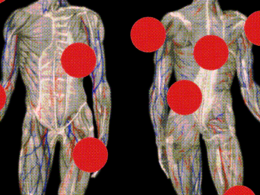the health strategist
knowledge platform
Joaquim Cardoso MSc.
Chief Research and Strategy Officer (CRSO),
Chief Editor and Senior Advisor
August 16, 2023
What is the message?
The article “COVID-19’s Impact on Heart Health Still Confounds Doctors”, published by Time, discusses the perplexing impact of COVID-19 on heart health, revealing a range of cardiovascular complications that persist even after mild infections.
It highlights the rise in heart-related issues, including increased blood pressure, heart attacks among young adults, and long-lasting cardiovascular symptoms, underscoring the need for continued research and interventions to address these complex aftereffects.
Key takeaways:
- Unforeseen Heart Health Impact: COVID-19 has had a profound impact on heart health, with a range of cardiovascular complications emerging even in those who had mild cases of the virus. The article underscores the baffling nature of these complications and the challenges they pose to medical professionals.
- Post-COVID Heart Risks: Individuals who have recovered from COVID-19 may be at an increased risk of experiencing new heart-related problems, including blood clots, irregular heartbeats, and heart attacks. These risks can persist for up to a year after the initial infection, even if the individual seemed to have recovered well.
- Long COVID’s Cardiovascular Effects: The concept of “long COVID” is discussed, highlighting that some patients experience lingering symptoms, including cardiovascular issues. Notably, cardiovascular problems can sometimes be the first or primary symptom of COVID-19 damage, complicating diagnosis.
- Impact on Mortality Rates: The article reveals that heart attack-caused deaths increased during COVID-19 surges, reversing a previous trend of declining heart-related mortality rates. The pandemic led to an unexpected rise in heart attack deaths, including among young adults who are not typically prone to heart issues.
- Blood Pressure and Heart Disease: The pandemic has seen a measurable increase in people’s blood pressure, a major risk factor for heart disease. This increase in blood pressure could contribute to the rise in heart-related complications observed during the pandemic.
- Effects on Blood Flow: Some “long COVID” patients experience abnormalities in blood flow, which may be related to the prolonged activation of the body’s stress response system. Improper functioning of small blood vessels also contributes to hindered blood flow in these patients.
- Complexity of COVID’s Impact: The article highlights the complexity of COVID-19’s impact on heart health and the lingering uncertainties about who is most susceptible to these complications and whether they are reversible. The intricacies of the relationship between COVID-19 and heart health remain a challenge for medical professionals.
- Importance of Modifiable Risk Factors: The article concludes by emphasizing the importance of addressing modifiable risk factors, such as high cholesterol, blood pressure, diabetes, and smoking. These factors play a significant role in mitigating the impact of COVID-19-related heart complications.
- Need for Ongoing Research: The article suggests that further research is necessary to better understand and manage the cardiovascular implications of COVID-19. The evolving nature of the pandemic and its impact on heart health warrant continued study and vigilance.
- Implications for Public Health: The article underscores that the aftermath of the pandemic may result in a population facing increased heart troubles due to COVID-19-related complications. This has potential long-term implications for healthcare systems and public health strategies.
One page summary:

The article titled “COVID-19’s Impact on Heart Health Still Confounds Doctors” explores the complex and evolving relationship between COVID-19 and its effects on heart health. The article emphasizes the challenges faced by medical professionals in understanding and managing the various cardiovascular complications arising from COVID-19 infections.
The narrative is centered around the case of Mike Camilleri, a firefighter and paramedic who experienced severe heart-related issues after a mild case of COVID-19. His symptoms included dangerous blood pressure spikes, increased heart rate with slight exertion, and intense chest pain. Camilleri’s case highlights the enigmatic nature of the post-COVID cardiovascular effects that have left doctors perplexed.
The article highlights that despite being well into the fourth year of the pandemic, the full extent of COVID-19’s impact on heart health is still unfolding. Dr. Susan Cheng, a cardiologist at Cedars-Sinai Medical Center, suggests that the heart and vascular system have been disproportionately affected, with a wide range of potential complications.
People who have recovered from COVID-19 may be at an increased risk of developing heart-related issues such as blood clots, irregular heartbeats, and even heart attacks for up to a year after their initial infection.
The uncertainty surrounding these aftereffects raises important questions: Who is most susceptible to experiencing these complications, and are they reversible? Some individuals may experience these heart-related problems as the primary or initial symptoms of COVID-19 damage, adding complexity to diagnosis and treatment.
The article underscores that heart attack deaths increased during periods of COVID-19 surges, erasing a decade of progress in heart-related mortality rates.
Young individuals, who are not typically prone to heart attacks, witnessed a nearly 30% increase in heart attack deaths during the pandemic’s early years. The pandemic also saw a measurable increase in people’s blood pressure, a significant risk factor for heart disease.
The article further delves into the concept of “long COVID,” a term encompassing a range of post-COVID symptoms, which may include cardiovascular issues. Dr. Amanda Verma, a cardiologist at Washington University, explains that some long COVID patients experience abnormalities in blood flow, which may be linked to persistent activation of the body’s stress response system. Moreover, the lining of small blood vessels may also function improperly, hindering blood flow.
Dr. Ziyad Al-Aly from Washington University cautions that the nation may emerge from the pandemic with a population experiencing increased heart troubles due to the virus. His research based on a Veterans Administration database indicates that individuals who survived COVID-19 were more likely to face heart-related complications, such as abnormal heartbeats, blood clots, chest pain, and heart attacks up to a year later.
While the overall risk per person might be small, due to the pandemic’s scale, millions could be left with cardiovascular symptoms. The article concludes by emphasizing the importance of addressing modifiable risk factors, such as high cholesterol, blood pressure, diabetes, and smoking, which are critical in mitigating the impact of COVID-19-related heart complications.
In summary, the article underscores the ongoing challenge of understanding and managing the diverse cardiovascular implications of COVID-19. It highlights the need for continued research, patient monitoring, and timely interventions to address the complex interplay between the virus and heart health.
Mentioned names
Mike Camilleri (firefighter and paramedic)
Dr. Susan Cheng (cardiologist at Cedars-Sinai Medical Center)
Dr. Amanda Verma (cardiologist at Washington University)
Dr. Ziyad Al-Aly (Washington University)
This is an executive summary based on the article “COVID-19’s Impact on Heart Health Still Confounds Doctors”, published by Time. To access the original article, click here.












